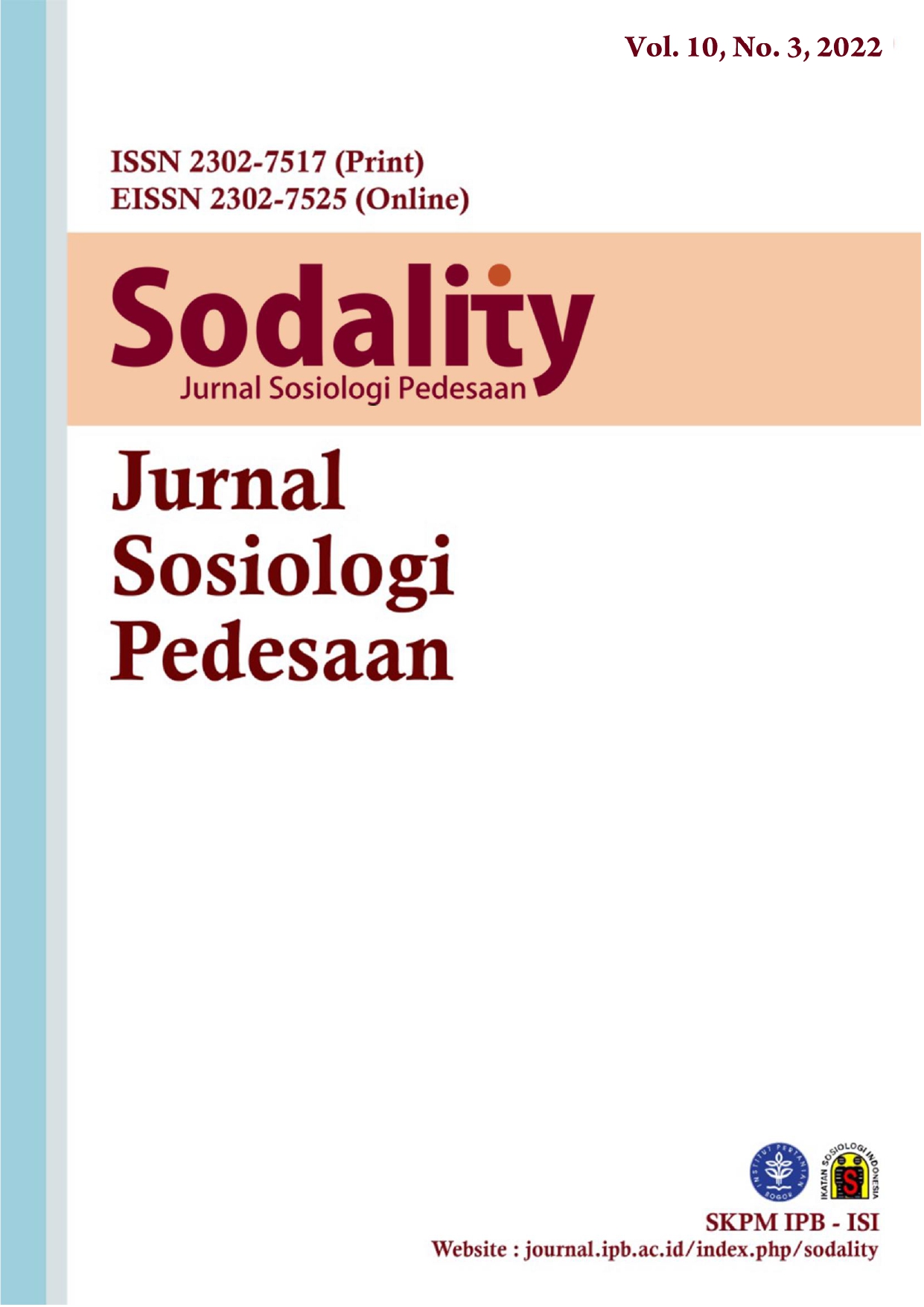Actor Contestation and Collaborative Empowerment Model of Orang Rimba in Bukit Duabelas National Park Jambi Province
Abstract
The empowerment of the Orang Rimba aims to enable them to get out of their marginal condition due to the development pattern that has not been on their side so far. This study aims to analyze how the contestation of various ideologies underlie various actors empowering the Orang Rimba and to formulate a collaborative model between actors in empowerment that can answer the needs of the Orang Rimba. The research uses a case study approach and is analyzed qualitatively. The results show that the empowerment of Orang Rimba is interpreted by the state as "modernization" by means of resettlement, using an economical approach as an indicator of the success of a program. NGOs interpret empowerment as building critical awareness by providing alternative education and advocacy, while Corporations empower them through CSR activities. Multi-stakeholder collaboration for empowerment can be carried out by utilizing a forum or Multi-stakeholder Cooperation Forum for the Empowerment of Orang Rimba. The multi-stakeholder collaborative model of empowerment through state facilitation, NGOs, and corporations has a common goal of increasing dignity and independence following the needs and socio-cultural conditions of the Orang Rimba.
References
Adiwibowo, S. (2005). Dongi-dongi Culmination of a Multidimensional Ecological Crisis: A Political Ecology Perspective. Disertasi Universität Kassel, https://kobra.uni-kassel.de/bitstream/handle/123456789/2006062113584/Soeryo+Adiwibowo.pdf;sequence=3.
Adiyoso, W. (2009). Menggugat Perencanaan Partisipatif dalam Pemberdayaan Masyarakat. Surabaya: Putra Media Nusantara.
Astarika, R. (2017). Pola Pemberdayaan Kultural Ekologis: Solusi Mengatasi Kerawanan Pangan Orang Rimba di Taman Nasional Bukit Dua Belas Jambi. Prosiding Seminar Nasional Tahunan Matematika, Sains Dan Teknologi, 213–222.
Astarika, R., Endang, P., & Sulastri, E. (2019). Membangun Sumber Daya Manusia Berkelanjutan pada Komunitas Adat Terpencil (Studi Kasus Suku Anak Dalam di Taman Nasional Bukit Duabelas Jambi). Jurnal Inovasi Sains Dan Teknologi (INSTEK), 2(1), 52–62. https://doi.org/10.51454/INSTEK.V2I1.97
Chambers, R. (1995). Rural Development: Putting the Last First. London: Longman.
Creswell, J. W. (2016). Research Design: Qualitative, Quantitative, and Mixed Methods Approaches. Sage Publications.
Freire, P. (1984). Pendidikan sebagai Praktek Pembebasan. Jakarta: Gramedia.
Habermas, J. (1996). Between Facts and Norms: Contributions to a Discourse Theory of Law and Democracy. Translated by William Rehg. Cambridge: Polity Press
Hardiman, F. B. (2009). Demokrasi Deliberatif: Menimbang Negara Hukum dan Ruang Publik dalam Teori Diskursus Jurgen Habermas. Yogyakarta: Kanisius.
Huberman, A. M., & Miles, M. B. (2002). The Qualitative Researcher’s Companion. Sage Publications.
Idris, N. (2017). Mengkaji Ulang Pola Komunikasi Pemerintah dalam Pemberdayaan Suku Anak Dalam di Provinsi Jambi. Jurnal Penelitian Pers Dan Komunikasi Pembangunan, 21(1), 37–48. https://doi.org/10.46426/JP2KP.V21I1.54
Ife, J. W. (1995). Community Development: Creating Community Alternatives - Vision, Analysis and Practice. Melbourne : Longman Australia
Manurung, B. (2014). Sokola Rimba. Jakarta: Gramedia
Mardiyati, A., & Gutomo, T. (2018). Kemandirian dan pemberdayaan komunitas adat terpencil di kabupaten merangin. Media Informasi Penelitian Kesejahteraan Sosial, 42(3), 263–274.
Mat Syuroh. (2011). Evaluasi Pelaksanaan Program Pembinaan Masyarakat Terasing di Indonesia. Sosiohumanika, 4(2), 229–248.
Muchlis, F. (2017). Praktik Komunikasi dalam Pemberdayaan Orang Rimba di Taman Nasional Bukit Duabelas Provinsi Jambi. Disertasi pada Sekolah Pascasarjana IPB University. https://repository.ipb.ac.id/handle/123456789/87811.
Muchlis, F., Lubis, D. P., Kinseng, R. A., & Tasman, A. (2016). Sejarah Marginalisasi Orang Rimba Bukit Dua Belas di Era Orde Baru. Paramita - Historical Studies Journal, 26(2), 217–229.
Nopriono, & Suswanta. (2019). Pemberdayaan Masyarakat dalam Perspektif Collaborative Governance. JPK: Jurnal Pemerintahan dan Kebijakan, 1(1), 7–8.
Nurfathiyah, P. (2021). Ruang Publik Dan Komunikasi Dialogis Orang Rimba di Taman Nasional Bukit Dua Belas Provinsi Jambi. Jurnal Ilmiah Sosio-Ekonomika Bisnis, 24(01), 1–11. https://doi.org/10.22437/JISEB.V24I01.13476.
Rahmadani, R., Raharjo, S. T., & Resnawaty, R. (2019). Fungsi Corporate Social Responsibility (CSR) dalam Pengembangan dan Pemberdayaan Masyarakat. Share: Social Work Journal, 8(2), 203. https://doi.org/10.24198/SHARE.V8I2.20081
Rasyid, A., Rasyid, A., Saleh, A., Cangara, H., & Priatna, W. B. (2015). Komunikasi dalam CSR Perusahaan: Pemberdayaan Masyarakat dan Membangun Citra Positif. MIMBAR: Jurnal Sosial dan Pembangunan, 31(2), 507–518. https://doi.org/10.29313/mimbar.v31i2.1564
Ridwan, M., & S., O. L. (2018). Model Pemberdayaan Suku Anak dalam Bidang Kesehatan di Kecamatan Batin XXIV Kabupaten Batanghari. Jurnal Kesmas Jambi, 2(2), 97–103. https://doi.org/10.22437/JKMJ.V2I2.6558
Rogers, E. m. (1985). Komunikasi dan Pembangunan: Perspektif Krisis. Jakarta: LP3ES.
Sapulette, A. A. (2021). Actors’ Construction in Building Social Harmony in Tamilouw, Seram Island, Maluku Province. Sodality: Jurnal Sosiologi Pedesaan, 9(3). https://doi.org/10.22500/9202131995.
Sidiq, R. S. S. (2020). Model Pemberdayaan Komunitas Adat Terpencil dalam Mengentaskan Kemiskinan Di Kabupaten Kepulauan Meranti. Reformasi, 10(2), 217–227. https://doi.org/10.33366/rfr.v10i2.1954.
Sumartono M.D. (2019). Dinamika Perubahan Sosial dalam Teori Konflik. Jurnal Ilmu Komunikasi Dan Bisnis, 5(1), 1–17. http://jurnal.stiks-tarakanita.ac.id/index.php/JIK/article/view/259
Wittmer H, B. R. (2005). Between Conservationism, Eco-populism and Developmentalism. FPRI : International Food Policy Research Institute. https://www.ifpri.org/publication/between-conservationism-eco-populism-and-developmentalism.
Yunus, F. (2007). Pendidikan Berbasis Realitas Sosial: Paulo Freire dan YB.Mangunwijaya. Yogyakarta: Logung Pustaka.
Authors who publish with this journal agree to the following terms:
- Authors retain copyright and grant the journal right of first publication with the work simultaneously licensed under a

This work is licensed under a Creative Commons Attribution 4.0 International License. that allows others to share the work with an acknowledgement of the work's authorship and initial publication in this journal. - Authors are able to enter into separate, additional contractual arrangements for the non-exclusive distribution of the journal's published version of the work (e.g., post it to an institutional repository or publish it in a book), with an acknowledgement of its initial publication in this journal.
- Authors are permitted and encouraged to post their work online (e.g., in institutional repositories or on their website) prior to and during the submission process, as it can lead to productive exchanges, as well as earlier and greater citation of published work (See The Effect of Open Access).





.png)









